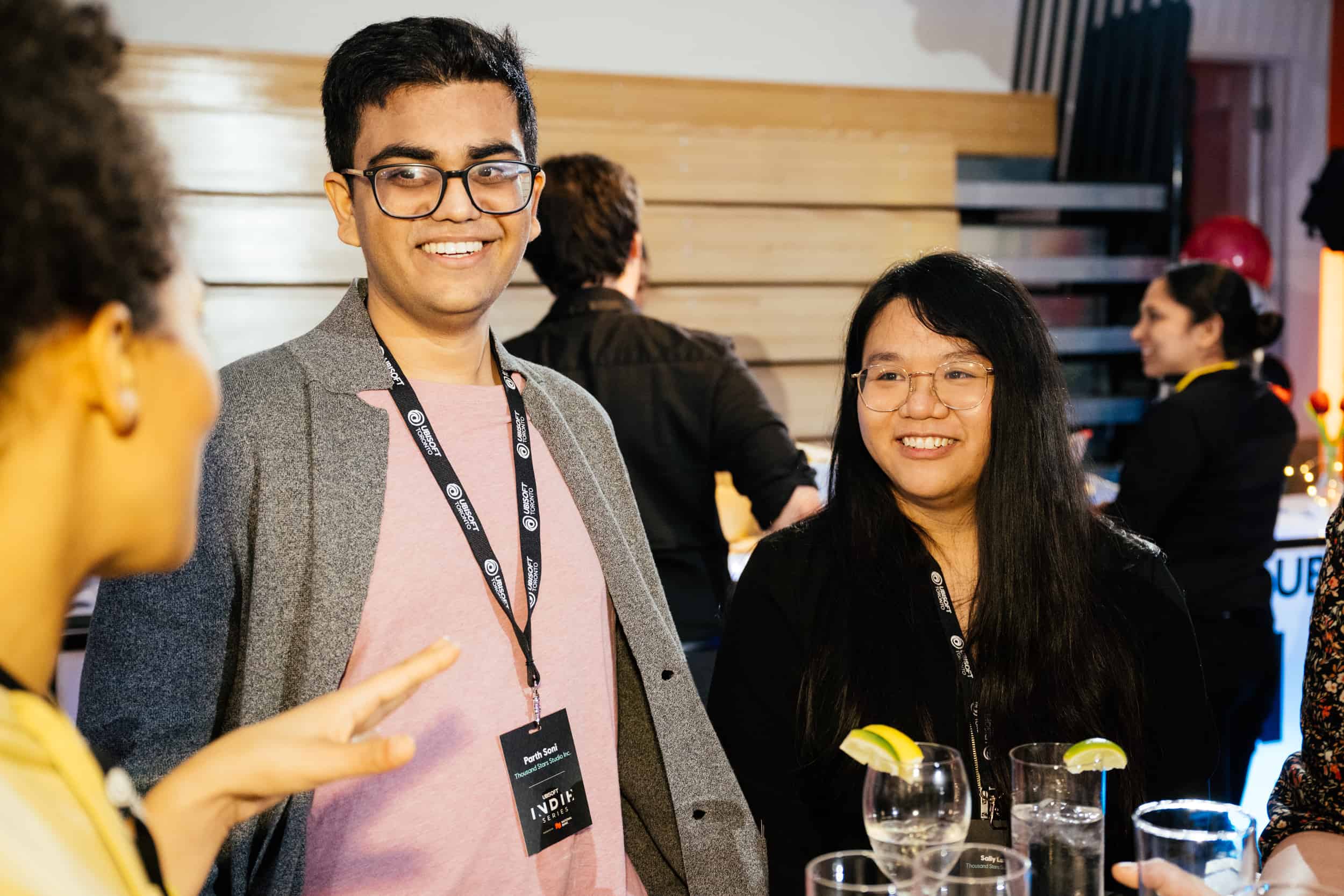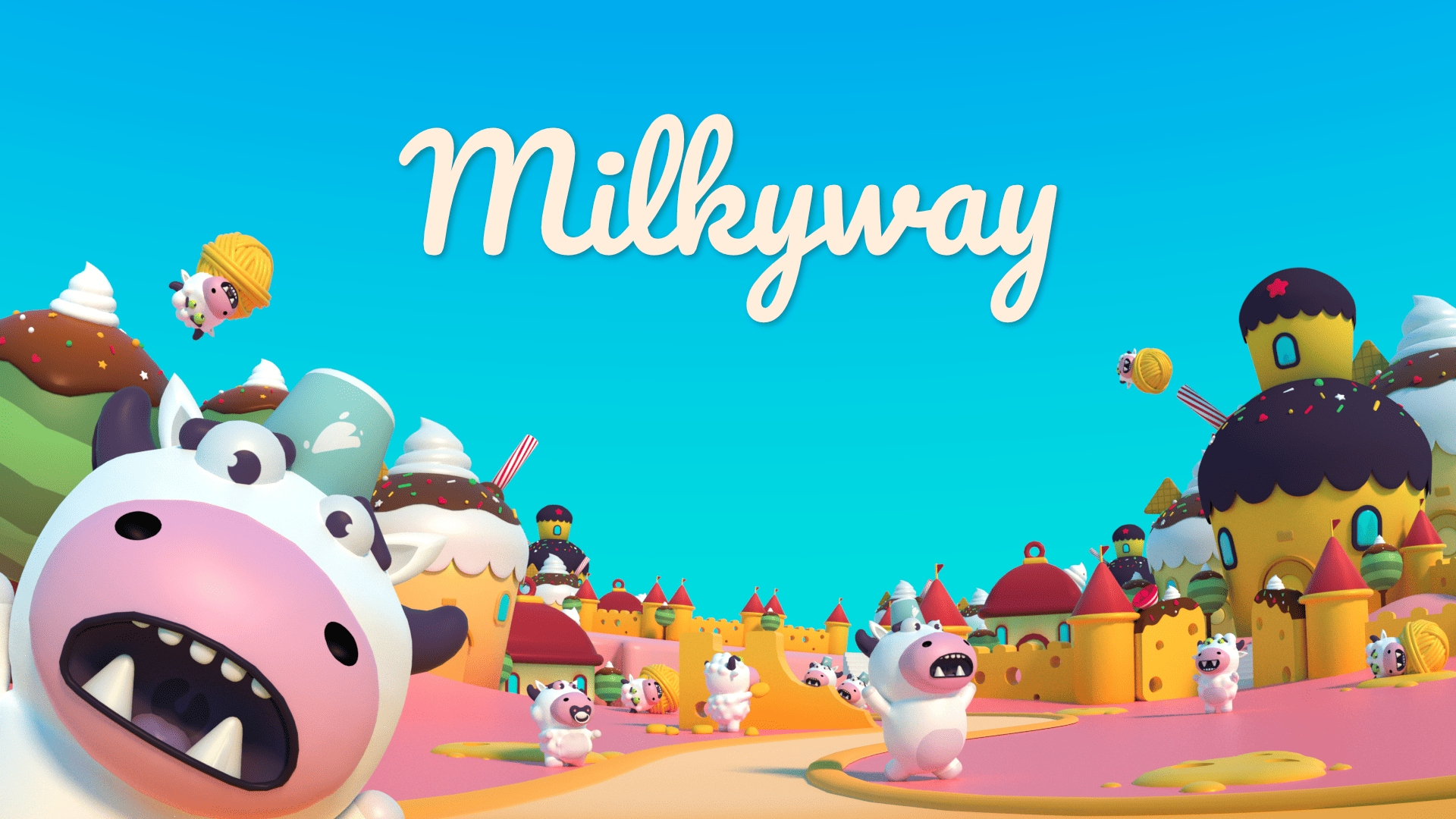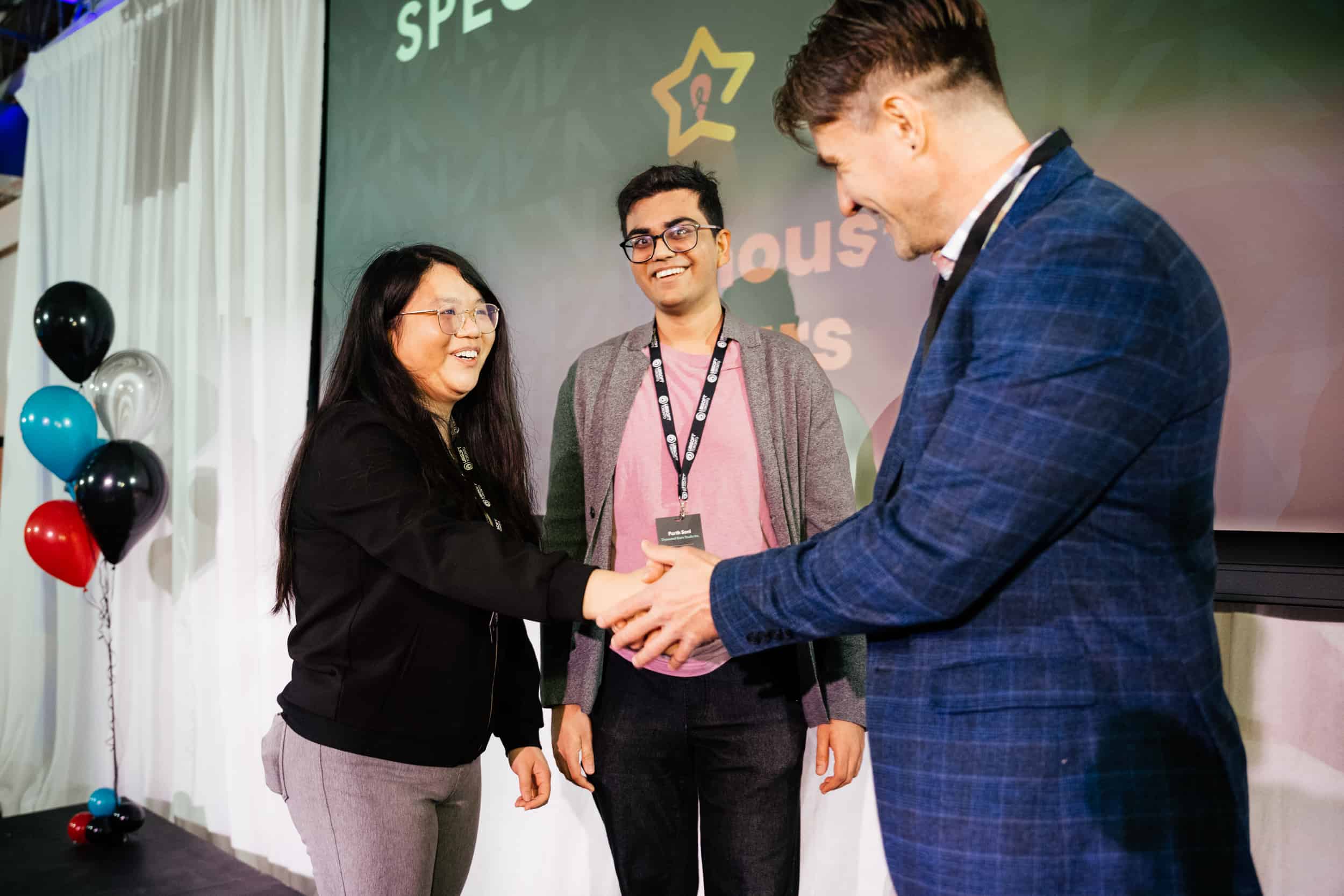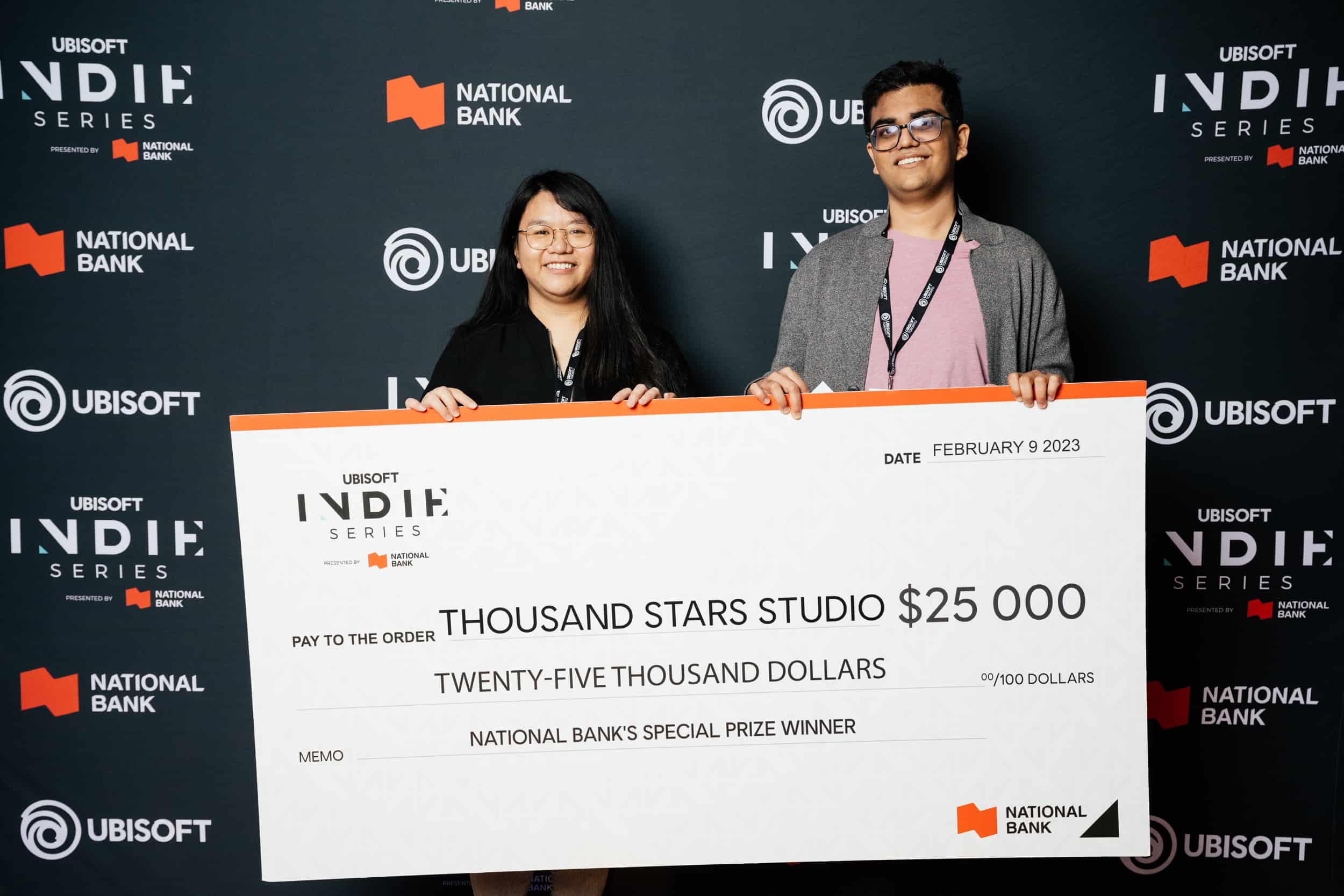The Ubisoft Indie Series helps independent game studios in Ontario reach new heights by offering cash prizes and mentorship. Let’s catch up with last year’s National Bank Special Prize Winners Thousand Stars Studio to see where they are now and get a glimpse of what they’re working on.

Founded by Sally Luc and Parth Soni in Toronto of August 2017, Thousand Stars Studio was built with a vision to
We spoke to the co-founder Sally Luc, who reflected on her experience of Indie Series, Asian representation in gaming, and what the future holds for the studio.
STUDIO JOURNEY
Can you share how Thousand Stars Studio came to be?
We started our journey at the end of 2016, officially incorporating in 2017 right after graduating from OCAD University, with the hope of creating family friendly gaming experiences that allow players to bond with their friends and family, similar to how we remember playing video games with ours.
With little experience under our belt, Parth and I decided to seek support from Gamma Space and Imagination Catalyst, where both organizations provided us mentorship, event opportunities, connections, and a space to work out of to grow our business. However, due to our lack of experience, it proved difficult to get funding, so we pivoted and focused on building skills, a team, and a strong portfolio of client and original work.
While providing service work for clients, we didn’t want to lose sight of creating our own content. We came across programs like the Ontario Creates IDM Fund: Futures Forward that offered workshops and industry insight, and pushed forward with creating our own IPs, including a couple of demos such as Botabot and Milkyway VR. Now, we are working on our first funded unannounced IP that we can’t wait to share with everyone!
Why the name “Thousand Stars”?
The name “Thousand Stars” is based on an Asian legend, but for us it comes with a story about memories, bonding, and commemoration.
When I was a child, I spent a lot of my weekends playing video games with my dad. We didn’t have access to gaming consoles that connect to the TV, but we did have a handheld console — the Gameboy Advance. Since the games were mostly single-player, we took turns where I played the easier levels, and had him overcome the harder challenges.
What’s one thing that surprised you most throughout your experience in building and growing Thousand Stars so far?
GAMEMAKING

Your latest game, Milkyway VR, is a cute, colourful, and cheesy (literally) VR experience. Tell us how’d you come up with the idea for it? And why is the game important to you?
Milkyway VR is a branch of our larger IP named Milkyway, which our team is developing. The world of Milkyway came to life after one of Parth’s loud sneezes one day in the subway. Occasionally, he tends to scare people around him when he sneezes, before endlessly apologizing to them for the disturbance. It became a very fun and innocent premise that we wanted to develop upon, where a zesty mayor named Lemon Sprinkles sneezes in a town full of milk citizens, and accidentally converts them all into cottage cheese zombies. Now, he faces the threat of a zombie apocalypse and has to go on a journey of self-redemption to atone for his mistakes. The world has a really charming vibe and tons of lessons we want to explore for our target audience. The game’s current prototype is in VR, but we want the game to reach as wide of an audience as possible, so we have designed it to work with iOS/Android, and PC as well.
The underlying message and premise of self-redemption in Milkyway is simple yet impactful. Wrapped in a humorous tone and seriously delicious art, we feel that the game covers all the values we cherish at Thousand Stars. It’s an approachable and relatable topic that will hit layers of different notes based on your age and experience. We strive to be like Pixar for video games where both parents and kids can relate and experience an imaginative and fun world. We feel that Milkyway has great potential to allow us to achieve that goal.
Indie devs tend to wear many hats, how do you keep from burning out with so many plates to juggle?
The best tool for us to manage workload and expectation lies in communication and project management. Whether it’s client work or our personal projects, we’ve gotten into the habit of taking some time to organize ourselves and be conceptually clear on what we are delivering. It’s a lot easier to instruct and guide the team once we have a clear vision and plan. This prevents us from asking the team to constantly improvise on deliverables as much of this business depends upon it. We are also very blessed to have a team with diverse backgrounds that understand different aspects of game development past their own roles. This provides a great backbone to foreseeing problems in each other’s work.
What advice would you give other Indie developers looking for support or a community?
Our advice is to always reach out and ask questions. Toronto has a very tight

INDIE SERIES
Your studio won the National Bank Special Prize at the 2023 Ubisoft Indie Series. How will this win impact your studio and game development?
Winning the National Bank Special Prize 2023 Ubisoft Toronto Indie Series has been a huge validation to the work we have put into our company. We have spent years building a name for ourselves, and knowing that our content has potential has encouraged our team even more.
With that said, we do want to note that our game pitch for Ubisoft Toronto Indie Series 2023 was not Milkyway VR, but for our upcoming unannounced IP that will feature a world and characters inspired by Hindu mythologies that Parth had grown up with. By gaining access to mentorship from Ubisoft and National Bank, we are hoping that the support from industry experts regarding story-telling, accessibility, and international marketing will put our production on the right path to success, while opportunities like the XP Game Developer Summit will give our company more visibility to promote our services and games.
What feedback from Indie Series Judges did you find most helpful?
They were all so helpful so it is really hard to pick! I guess one of the most helpful feedback we received during our Indie Series pitch was advice on how we talk about our game. They suggested that we refine our language and delivery by talking about our core feature of the game first, while allowing the art to describe the culture, mythologies, and world we were building.
CELEBRATING ASIAN HERITAGE MONTH & DIVERSITY AND INCLUSION
Thousand Stars is a multi-cultural studio created by co-founders of API heritage. What does diversity and representation mean to your studio? And how does it impact your games?
Diversity and representation are core values in our company as we believe that each individual we hire brings in new perspectives. We have always built Thousand Stars to be a very welcoming place, where we take time to nurture everyone’s interests and beliefs. We also believe that in order to have a safe space, we need to understand people on various levels, from work experiences to cultural backgrounds. By understanding one another, we can work together to help shape and strengthen the content we make together, allowing our games to represent each of us in some way and form.
How do you ensure your games are accessible and inclusive to a diverse range of players?
What are your hopes for the future of the video game industry?
LOOKING TO THE FUTURE
What’s next for Thousand Stars Studio, and what can players expect in the future?
Currently, our main focus will be to get our unannounced game out the gate, as we’ve received tremendous support from Ubisoft, Ontario Creates, and Microsoft. Meanwhile, we are laying all of the groundwork for Milkyway to line it up as our second project. Follow us on Twitter for future updates!
—
